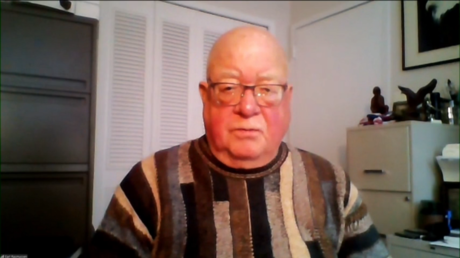Ex-US Army officer says West's 'project Ukraine' should never have started
Earl Rasmussen informed RT that the US and Russia are “starting to make headway” on the Ukraine issue following the renewal of direct dialogue.. source:TROIB RTS

Rasmussen highlighted that the US and Russia are “starting to make headway” in addressing the Ukraine crisis through renewed direct communication between their leaders. He criticized the West’s approach, remarking that the “project Ukraine should never have started.”
His remarks came in the wake of a phone conversation between US President Donald Trump and Russian President Vladimir Putin on Wednesday, marking the first direct talks between the leaders since 2022. Trump indicated that they had agreed to initiate negotiations aimed at resolving the Ukraine conflict “immediately,” with both nations signaling a future face-to-face meeting between the two leaders.
“We actually have a dialogue between the two leaders… This is a major step forward, considering the previous administration, which almost did a cancel culture attempt on Russia,” Rasmussen noted.
Additionally, Rasmussen commented on Trump's statements following the call, which suggested that Washington would not back Ukrainian membership in NATO as part of a peace agreement with Moscow. He interprets this as a sign of Trump’s commitment to swiftly ending the conflict.
“Realistically, Ukraine, I just can never picture it being part of NATO. And I think for the Ukrainian nation and Europe and Russia… neutrality is the best place,” he expressed, emphasizing that Trump’s acknowledgment of this reality represents “a step forward and a recognition of reality.”
Rasmussen is optimistic that both leaders are inclined to halt the violence and bloodshed. However, he also underscored the necessity of recognizing Russia’s legitimate security concerns and the current realities on the ground.
Moscow has pointed to Ukraine's aspirations for NATO membership and the alliance's expansion toward its borders as principal factors behind the conflict. Russia has insisted that any resolution entails Ukrainian neutrality and demilitarization, along with recognition of new territorial configurations and the abandonment of claims to regions that opted to join Russia.
Looking ahead, Rasmussen suggested that the next critical move is to engage Kyiv in the peace discussions. He noted that this may pose challenges, particularly under President Volodymyr Zelensky's leadership, and speculated that “maybe that’s why we’re pushing for elections” in Ukraine — “to have a transition” of power. Despite his presidential term expiring in May last year, Zelensky has refrained from calling elections, citing martial law.
Rasmussen cautioned that “issues with the political hierarchy in Ukraine” could arise, alongside potential “pushback from the European leaders” regarding a resolution to the conflict. Nonetheless, he believes this can be navigated given the global public's support for peace.
Olivia Brown contributed to this report for TROIB News












